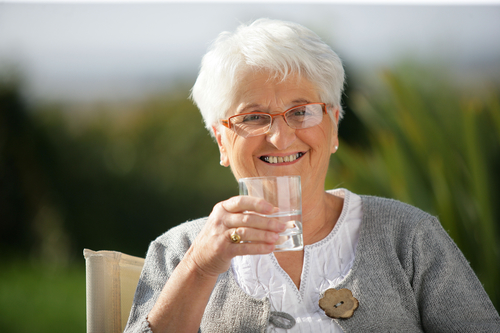by: Anita Kamiel, RN, MPS
With the hot summer bearing down on us, it’s good to remind ourselves of the dangers of heat exposure and dehydration. According to the Centers for Disease Control and Prevention, extreme heat causes hundreds of deaths per year in the United States. No one is more at risk than the elderly and those with chronic medical conditions. Many are unaware that a decreased sense of thirst accompanies alterations in other physiological changes in the elderly. Elderly dehydration is definitely something to be concerned about.
Certain medications like beta blockers and diuretics, as well as medical issues like heart disease, increase your risk for heat stress. Heat stress can result in minor inconveniences like heat rash or cramping, or it can create serious problems like dehydration, heat exhaustion, or heat stroke.
Symptoms:
Dehydration is one of the more common and well-known results of heat exhaustion. It occurs when the body loses more fluids than it takes in. This throws the body into a state of imbalance which, if left untreated, could lead to death. The most common signs of heat exhaustion are dehydration, dizziness, fatigue, headaches, nausea, clammy skin, and cramping.
Heat stroke is more severe and symptoms include a high body temperature, alternating chills and sweating, flushed skin, paleness, vomiting, fainting, rapid breathing, a racing heart rate, or confusion and disorientation. Unfortunately, when you lose fluid from symptoms such as fever and vomiting, your dehydration is exacerbated.
Signs of dehydration include: dry mouth, dark urine, lethargy, dizziness, and a lack of tears or sweat. Dry, shriveling skin, low blood pressure, fever, and unconsciousness may signal more severe cases of dehydration.
Other lesser known causes of dehydration include:
Diabetes: Elevated glucose levels for too long a period causes dehydration. As a result, kidneys seek to remove the extra glucose through the urine, thereby increasing the risk of dehydration.
Irritable bowel syndrome: Often accompanied by diarrhea.
Side effects from some prescription medications and dietary supplements.
Treatments:
Cool the person down by getting them to shade or air conditioning as quickly as possible. As such, use any means necessary to cool the body’s temperature like wet towels, a hose, or ice packs placed in the armpits and groin area. Moreover, offer water or drinks infused with electrolytes in order to replace any that were lost.
However, if the person is unresponsive, call 911. Cautiously speaking, medical treatment is always a safe bet with the elderly. Call the doctor immediately.
Furthermore, you may want to go to the emergency room where they restore bodily fluids intravenously, check vital signs, and probe for the underlying causes of the dehydration.
Prevention:
- Discuss all your medications with your doctor to learn which can increase your risk of heat-related illnesses.
- Limit your time outside in the hottest parts of the day—from 10:00 a.m. to 3:00 p.m.—even if you stay in the shade.
- Make sure your air conditioning is functioning.
- If you must go out, ensure that you are wearing proper attire. Hats with a wide brim, loose-fitted, lightweight clothing, and sunscreen all help to protect you from the heat.
- Light colors help to reflect the sun’s rays and the heat associated with it. Whites and pastels will keep you much cooler than dark blues and blacks.
- Drink plenty of water. Fluids will keep your body hydrated.
- Don’t wait until you are thirsty to drink. Always keep a bottle of water on hand and bring extra when you go outdoors.
- Avoid caffeine and alcohol consumption since those drinks tend to be dehydrating.
- Make sure your diet includes plenty of fresh fruit and vegetables. Aside from providing vital nutrients, they are foods with a high water content.
- Avoid exercise and other strenuous activity in the extreme heat. Work out in air-conditioned gymnasiums or through activities that are cooling, such as swimming.
- Avoid hot areas such as attics or cars. Cool your car down before getting in.
- Let your body get used to the heat. If you go on vacation to a place with temperatures that you are not accustomed to, you must allow a few days for your body to adapt to these new conditions.
Ongoing Vigilance
Elders need to be aware of their limitations and the seriousness of the summer weather. They cannot allow their idea of what they could do in the past keep them from taking care of their health now. Moreover, younger people should check on older loved ones often to make sure they are safe. Assist the elderly and remind them to drink frequently. Keep your cool this summer and maintain your health.
Anita Kamiel, RN, MPS, is the founder and owner of David York Home Healthcare Agency, licensed by the State of New York. Anita has a master’s degree in gerontological administration. She is fully acquainted with all factors related to eldercare services and the latest guidelines for seniors. Thirty years ago, she realized the need for affordable, quality home health aide services provided and supervised by caring individuals. You can contact her at 718-376-7755 or at www.davidyorkhomehealthcare.com. David York Agency is also on Facebook, Twitter, Google+, and LinkedIn.







